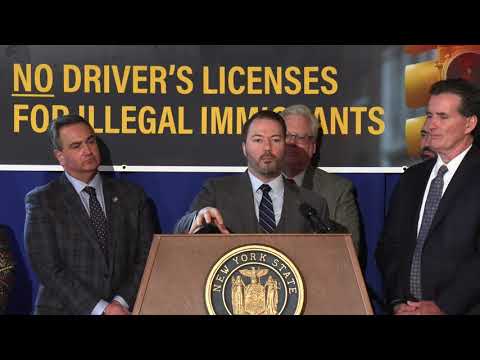
Senator Flanagan Sponsors Property Tax Cap
John J. Flanagan
February 2, 2011
-
ISSUE:
- Property Tax
Senator John Flanagan (2nd Senate District) announced today that legislation he sponsored in the New York State Senate to cap property tax growth has been successfully passed. The legislation, which is now in the hands of the Assembly, would cap the growth of school and local taxes at two percent or the Consumer Price Index (CPI), whichever is less.
In addition, the Republican-led Senate approved two measures related to providing mandate relief to school districts and local governments.
"Our number one priority right now is to restore our economy by controlling runaway spending and providing substantial property tax relief,” stated Senator Flanagan. “The reality is that residents and businesses are leaving the state in droves because they cannot continue to pay skyrocketing property and job-killing business taxes. Today's action by the Senate is a reasonable step to help keep people in their homes and small businesses operating, while maintaining essential quality services at the local level."
“With this bill we are keeping our commitment to provide real property tax relief to homeowners across the state who are sick and tired of paying the highest property taxes in the nation,” Senate Majority Leader Dean G. Skelos said. “I applaud Governor Cuomo for submitting this bill and making the cap a priority. The Senate is ready to put it in law, now we need the Assembly to join us in passing this measure so we can stop the dramatic growth in property taxes and provide the relief that taxpayers desperately need.”
The bill, which is supported by business organizations across the state, includes the following provisions:
> A school district's tax levy limit, excluding the taxes necessary to support the local share of capital expenditures, could increase by either two percent or the annual increase in the consumer price index ("CPI") whichever is lower;
> A school district would be allowed to carry over unused tax levy capacity from the prior year but could use this carryover levy capacity to increase its tax levy only an additional 1.5% in any year; and
> In the event a district's actual tax levy exceeds its authorized levy due to clerical or technical errors, the mistaken excess levy must be placed in reserve to offset the levy for the next school year.
Every school district affected by the cap would be required to submit a tax levy proposition for approval by voters at the district's annual meeting on the 3rd Tuesday in May. If the proposed tax levy is within the district's tax levy limit, then a simple majority vote would be required for approval. If the school district’s proposed tax levy exceeds the district's tax levy limit, then the vote threshold required for approval would be 60 percent.
In the event the tax levy is defeated, then the district would be required to submit a second tax levy proposition for voter approval by voters at a district meeting held on the 3rd Tuesday in June. If the proposed tax levy is within the district's tax levy limit, then a majority vote would be required for approval but if the proposed tax increase exceeds the district's limit, then they would need the approval of 60 percent for passage.
If that second proposition is defeated, then the district would be required to adopt a tax levy that is no greater than the prior school year.
The tax cap legislation also provides for the same cap to apply to taxes levied by municipal governments. Under the legislation, local governments that implement a tax rate lower than the cap in one year will be allowed to rollover that amount up to 1.5 percent in the following year.
If the Assembly joins the Senate in acting, the law would be in effect for the 2012-13 school year and would make New York the 44th state to cap local property taxes.
This property tax cap proposal has tremendous support, not only among taxpayers throughout the state, but among major business organizations.
Kevin S. Law, President and CEO of the Long Island Association said: "Senate Majority Leader Skelos and the Long Island Senate delegation are to be applauded for passing this property tax cap legislation. This is a critical first step in relieving the property tax burden and needs to be joined by a reduction in unfunded mandates on our local governments. Reducing the tax burden on the business community is an important facet in getting this stagnant economy moving again."
Mike Elmendorf, NYS Director of the National Federation of Independent Business (NFIB) said: “NFIB commends the State Senate Majority for once again standing with small business and job creators by today swiftly passing Governor Cuomo's property tax cap. Out of control property taxes have been laying waste to our economy and driving people from their businesses and homes for far too long. Today's bipartisan vote is a critical first step toward relief for New York's overburdened job creators and taxpayers."
To make sure that school districts and localities that are impacted by this cap are still able to provide services needed by the public, Senator Flanagan also cosponsored important mandate relief legislation. This legislation would require that the state fund any state mandated program that is imposed on municipalities or school districts and creates any net additional costs.
It was approved in the Senate and is awaiting approval in the Assembly.
In addition to the property tax cap legislation, the Senate approved a resolution urging the Governor and his Mandate Relief and Medicaid Redesign Teams, to provide lasting and meaningful real property tax relief.
Specifically, the resolution urges the mandate relief panel to:
> Focus on New York’s service delivery structure that requires school districts, local governments and other local taxing districts to administer and fund mandated programs;
> Look for ways to reduce the costs of mandated programs on schools and local governments by determining how school districts and local governments may be given greater ability to control costs;
> Examine the reason for delays in state reimbursement for mandated programs;
> Consider the practice of cost-shifting of mandated programs; and
> Identify opportunities for eliminating or reducing unfunded and underfunded mandates imposed by the New York State government on local governments and school districts.
The resolution also urges the Governor’s Medicaid redesign panel to work with Medicaid stakeholders to conduct a comprehensive review of the state’s Medicaid program, and make recommendations for cost savings and quality improvement measures to meet specific budget reductions for Medicaid spending.
“Placing a cap on taxes is a great way to protect taxpayers but it needs to be coupled with real mandate relief if it is to be effective for our residents. New York State needs to continue working with our other governing bodies to protect our taxpayers from both high taxes and a drastic reduction in needed services. With this package, we can accomplish both and that is good for our entire state,” added Senator Flanagan.
Share this Article or Press Release
Newsroom
Go to NewsroomSenator Flanagan Again Joining Long Island Cares To Help Protect Pets
February 28, 2020


Senator Flanagan Welcomes Gold Award Recipient
February 18, 2020

